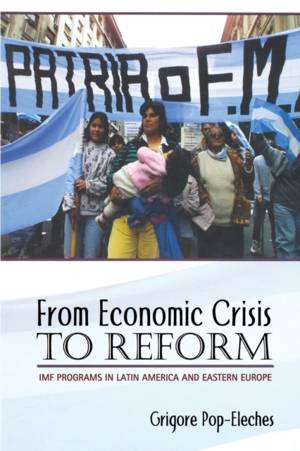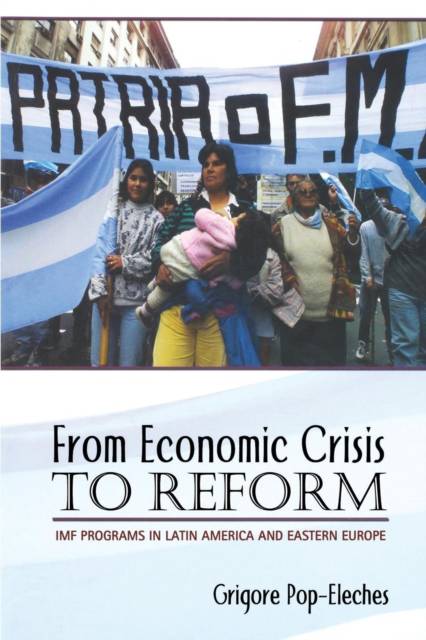
Door een staking bij bpost kan je online bestelling op dit moment iets langer onderweg zijn dan voorzien. Dringend iets nodig? Onze winkels ontvangen jou met open armen!
- Afhalen na 1 uur in een winkel met voorraad
- Gratis thuislevering in België vanaf € 30
- Ruim aanbod met 7 miljoen producten
Door een staking bij bpost kan je online bestelling op dit moment iets langer onderweg zijn dan voorzien. Dringend iets nodig? Onze winkels ontvangen jou met open armen!
- Afhalen na 1 uur in een winkel met voorraad
- Gratis thuislevering in België vanaf € 30
- Ruim aanbod met 7 miljoen producten
Zoeken
From Economic Crisis to Reform
IMF Programs in Latin America and Eastern Europe
Grigore Pop-Eleches
Paperback | Engels
€ 70,95
+ 141 punten
Omschrijving
The wave of neoliberal economic reforms in the developing world since the 1980s has been regarded as the result of both severe economic crises and policy pressures from global financial institutions such as the International Monetary Fund (IMF). Using comparative evidence from the initiation and implementation of IMF programs in Latin America and Eastern Europe, From Economic Crisis to Reform shows that economic crises do not necessarily persuade governments to adopt IMF-style economic policies. Instead, ideology, interests, and institutions, at both the international and domestic levels, mediate responses to such crises.
Grigore Pop-Eleches explains that the IMF's response to economic crises reflects the changing priorities of large IMF member countries. He argues that the IMF gives greater attention and favorable treatment to economic crises when they occur in economically or politically important countries. The book also shows how during the neoliberal consensus of the 1990s, economic crises triggered IMF-style reforms from governments across the ideological spectrum and how these reforms were broadly compatible with democratic politics. By contrast, during the Latin American debt crisis, the contentious politics of IMF programs reflected the ideological rivalries of the Cold War. Economic crises triggered ideologically divergent domestic policy responses and democracy was often at odds with economic adjustment. The author demonstrates that an economic crisis triggers neoliberal economic reforms only when the government and the IMF agree about the roots and severity of the crisis.Specificaties
Betrokkenen
- Auteur(s):
- Uitgeverij:
Inhoud
- Aantal bladzijden:
- 368
- Taal:
- Engels
Eigenschappen
- Productcode (EAN):
- 9780691139524
- Verschijningsdatum:
- 28/12/2008
- Uitvoering:
- Paperback
- Formaat:
- Trade paperback (VS)
- Afmetingen:
- 150 mm x 231 mm
- Gewicht:
- 544 g

Alleen bij Standaard Boekhandel
+ 141 punten op je klantenkaart van Standaard Boekhandel
Beoordelingen
We publiceren alleen reviews die voldoen aan de voorwaarden voor reviews. Bekijk onze voorwaarden voor reviews.











